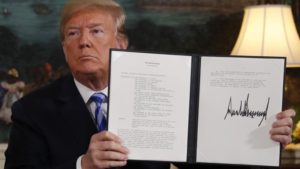I am still trying to digest the implications of Donald Trump’s decision to pull the United States out of a deal that would prohibit Iran from obtaining a nuclear weapon.
The president railed against the deal struck in 2015 as a terrible agreement. He said he couldn’t in good faith keep the United States involved in a pact that had the endorsement of virtually all of our major strategic allies.
Here’s the question for which I cannot find an answer: Why is “no deal” better than a bad deal that could be improved?
U.S. House Armed Services Committee Chairman Mac Thornberry — who happens to represent the Texas Panhandle in the House of Representatives — questions the wisdom of backing out of the deal without trying to persuade our European allies to work even harder to hammer out a better deal.
Did the president exhaust all of our diplomatic options? Every single one of them? Were there no avenues to explore? None? Anywhere?
The defense secretary and Joint Chiefs chairman both concurred that Iran was complying with the strict inspection protocol that had been written into the deal. Trump said Iran wasn’t. Who do we believe? No need to answer that one. I know who I believe — and it isn’t the commander in chief.
The president’s first task is to protect us from our enemies. I do not believe Donald Trump has fulfilled that task by tossing the Iran nuclear deal into the trash bin.
Let’s remember this fact that hasn’t yet been discussed fully in the hours since Trump’s announcement: Iran was a signatory to the agreement; if the Iranians remain a part of it, the deal sticks; if they don’t, all bets are off and they will resume their quest for a nuclear weapon.
Do you feel safer now? Neither do I.
